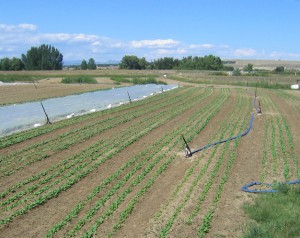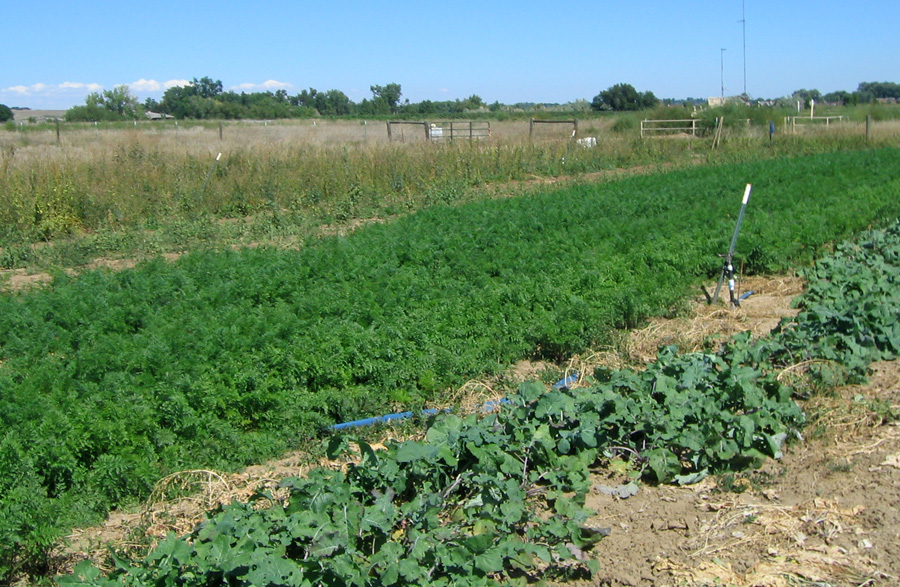Note from Priscilla: Slow money is about putting your money where your mouth is, says guest writer Julene Bair. It’s about attracting investment to entrepreneurs, including farmers, who are promoting healthy, local food supplies. This upcoming conference brings together people who love the land and are seeking new ways to channel financial resources toward healthier lands and foods. This is cross-posted at Big Picture Agriculture.
I’ve scattered throughout her post some photos I took in September at the Red Wagon Organic Farm, where I am a CSA subscriber. Community-supported agriculture (CSA) is one way to support slow food. Here is the soil where my vegetables grew!
Slow Money October Gathering Offers Ways to Invest in Slow Food
by Julene Bair
Food security, whether it’s on the personal or international level, is too important to be taken for granted. This is true especially now, when food systems are threatened by  chemical pollution, the loss of topsoil, and the limits of aquifers and oil. The Slow Food movement offers a promising response to these perils. That we should slow down, grow some of our own food, buy locally what we can’t grow ourselves, and cook using whole foods instead of opening cans or buying fast food burgers not only makes health sense. Our future depends on it. When most of the oil is gone, and it becomes too expensive to ship food from across the world, how else will our children and grandchildren eat?
chemical pollution, the loss of topsoil, and the limits of aquifers and oil. The Slow Food movement offers a promising response to these perils. That we should slow down, grow some of our own food, buy locally what we can’t grow ourselves, and cook using whole foods instead of opening cans or buying fast food burgers not only makes health sense. Our future depends on it. When most of the oil is gone, and it becomes too expensive to ship food from across the world, how else will our children and grandchildren eat?
Financial security, for those of us who are accustomed to it, is no longer guaranteed either. With the European debt crisis looming, the economy threatens to tumble into another recession. Many warn that we have come to the end of the age of prosperity brought about by cheap oil and that we cannot expect continued, infinite economical growth when our resources are finite.
 These two forms of insecurity, in our food and financial futures, motivate me to seek a more sound and sensible way to invest. I cannot, in good judgment, continue buying stock in companies that are contributing to the ruin. Ideally, I would put my money where my mouth is. I mean not only in terms of what I preach, but what I eat. And now that a long-awaited sibling of the Slow Food movement has appeared on the scene, I think I may be able to.
These two forms of insecurity, in our food and financial futures, motivate me to seek a more sound and sensible way to invest. I cannot, in good judgment, continue buying stock in companies that are contributing to the ruin. Ideally, I would put my money where my mouth is. I mean not only in terms of what I preach, but what I eat. And now that a long-awaited sibling of the Slow Food movement has appeared on the scene, I think I may be able to.
Slow Money is predicated on the idea that conscientious people will choose to invest ethically and for a viable future if given the opportunity. The concept came to the world’s attention in 2009 with Inquires into the Nature of Slow Money: Investing as if Food, Farms, and Fertility Mattered, a book by Woody Tasch. Tasch went on to found an NGO, which is putting investors in touch with organic producers and a whole host of other entrepreneurs whose businesses support the restoration of healthy, local food supplies.
 For the third year in a row, Slow Money will hold a national gathering on October 12-14, in San Francisco. Luminaries in the international environmental movement, such as Wes Jackson of the Land Institute and Vandana Shiva, named by Forbes “one of the seven most influential women in the world,” will share their visionary solutions in keynote addresses.
For the third year in a row, Slow Money will hold a national gathering on October 12-14, in San Francisco. Luminaries in the international environmental movement, such as Wes Jackson of the Land Institute and Vandana Shiva, named by Forbes “one of the seven most influential women in the world,” will share their visionary solutions in keynote addresses.
The financial side of solving our future will be illuminated in keynotes by, among others, Matt Flannery, the co-founder of Kiva.org, and Chris Martenson, whose Crash Course video series has brought millions of viewers face to face with what the end of cheap oil will likely mean for their portfolios. Thirty entrepreneurs from around the country have been chosen to showcase their young companies. Among them are farms that produce everything from milk to fruit, budding distribution networks, a farm waste recycler, a farm-based renewable energy company, a botanical pharmaceutical company, and a developer of nontoxic insecticides.
 Investors looking to explore these possibilities will have a host of break-out sessions to choose from. During these sessions, dozens of other presenters who are either innovating new ways to localize food or have been successful generating capital for small and local food-related enterprises will offer their alternatives and insights.
Investors looking to explore these possibilities will have a host of break-out sessions to choose from. During these sessions, dozens of other presenters who are either innovating new ways to localize food or have been successful generating capital for small and local food-related enterprises will offer their alternatives and insights.
The full, three-day registration fee for those whose interest is primarily financial is $895. Nonprofits, social entrepreneurs, startup developers, or concerned citizens pay $595. Lunches are provided, and an opening reception will offer food and music. One-day passes range in price from $195 to $495. For further information, the website is [no longer available].
Julene Bair lives in Longmont, Colorado. Her first book is One Degree West: Reflections of a Plainsdaughter. Her recently completed second book, Ogallala: One Woman’s Story of Land, Love, Water, and Loss, is in process.
Update: Julene’s book was published in 2014 as The Ogallala Road: A Memoir of Love and Reckoning, by Viking/Penguin.
